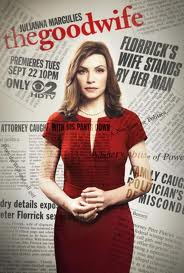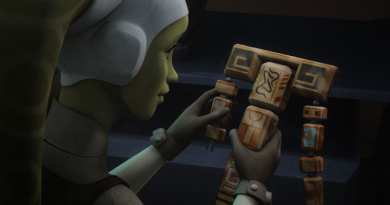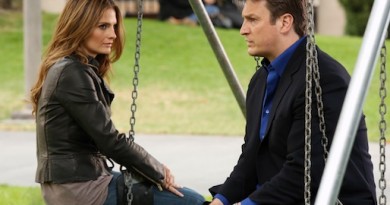What’s Good for the Goose is Good for the Gander
Several days ago, Today Television posted an article entitled Geek girls power viewership for sci-fi/fantasy TV: ‘Game of Thrones’ and other manly shows featuring strong women draw female audiences. The title of the article alone is interesting. What exactly constitutes a “manly” show? Does it have guns or spaceships or hobbits? The implication is that because it’s a medieval-setting fantasy story, HBO must have in mind a male-skewed target audience, instead of simply a show that appeals to men and women both – something like, you know, The Sopranos.
The Today article itself, fortunately, focuses on the power of the female audience, so maybe the title was more a misplaced choice of words in the attempt to be journalistically concise in a headline. But it’s still symptomatic of a broader dynamic: the widespread but wildly inaccurate perception that most kinds of traditionally geek entertainment don’t appeal to large numbers of women. Just today, Amy Ratcliffe (who was quoted in the article) posted on her Geek With Curves blog to take issue with exactly that kind of ignorance and disrespect appearing in a New York Times review of Game of Thrones. Amy is spot on, and anyone who thinks female geeks don’t have significant purchasing power in the marketplace doesn’t know what they’re talking about.
There’s one other point brought up in the Today article and its headline that’s worth emphasizing again. It’s true that having strong female characters is something that will help to draw a female audience – but I actually think it’s broader than that. I’ve written a lot about the lack of parity in stories regarding strong female characters, but ultimately the goal is to have good storytelling, not storytelling that’s less manly or more womanly. In most contexts good storytelling that will appeal to a broad audience, by its very nature, is going to include strong female characters just like it includes strong male characters.
 Take for instance, CBS’ The Good Wife. The show’s premise takes an increasingly prominent figure in our culture – the wife who stands by her cheating, politically consumed man – and reveals that the woman behind the stereotype can be strong, independent, and resourceful. Is it a womanly show? No – it’s a good show. And it’s a hit show because it tells stories men and women want to watch.
Take for instance, CBS’ The Good Wife. The show’s premise takes an increasingly prominent figure in our culture – the wife who stands by her cheating, politically consumed man – and reveals that the woman behind the stereotype can be strong, independent, and resourceful. Is it a womanly show? No – it’s a good show. And it’s a hit show because it tells stories men and women want to watch.
There is a similar dynamic with the Cartoon Network’s The Clone Wars, which is aimed at the youth demographic but has managed to generate buzz among the adult crowd (and not just parents) simply because it provides well-crafted storylines and underlying mature themes. Battlestar Galactica, Buffy the Vampire Slayer, and Angel most certainly had a target audience, but it was the ability of their writers to write around universally appealing topics that made them hits. The same can be said for current hit shows such as Castle, Fringe, and The Vampire Diaries.
While the goal of blogs like mine is to bring the playing field up to level by forcing corporate executives to recognize that women want and deserve equivalent representation as heroines and central protagonists, this doesn’t have to be to the detriment of the story or the product. Writers and storytellers shouldn’t have to go out of their way to say, “Oh, we need to add a strong female character so we can attract a female audience.” If you’re telling a good story, then women will like it – and if you’re doing it right, all the characters will be organic to the story, not deliberately constructed for a target demographic. Good storytelling is simply good storytelling. After years in the business world, I know one thing is true about marketing – you can do everything right to cultivate customers, but if your product stinks, it isn’t going to sell.
The biggest single problem right now in getting equivalency, though, is that there is still a lack of ability in the entertainment industry – movies, television, and books – to adapt. Take for instance the following passage from the Today article:
At San Francisco’s WonderCon in April, the premium cable network broke out the big guns to promote “Game of Thrones,” from photo ops with the intricate Iron Throne to T-shirts promoting all families involved in the fantasy saga: House Targaryen. House Stark. House Lannister. House Baratheon.
But nowhere in the house were women’s sizes.
“We were ready to buy, eager to wear the shirts right there around WonderCon, but all they had were men’s small sizes,” Thorpe said. “They said we could go online and order them, but that’s not the point. The point is they obviously didn’t realize there’s a large number of girls who are fans. All that planning and they blocked out 51 percent of their audience.”
 Apparently at least one person thinks Game of Thrones is a “manly” show: the person who ordered those t-shirts. Considering HBO’s entertainment president Sue Naegle felt Game of Thrones would capture the desirable female demographic, it seems somewhere down the line someone in the marketing chain didn’t get the message. That is a failure corporately to make sure everyone on the team understands the game plan. Or putting it in geek terms – if the goal is to destroy the Death Star, you’ve got to have your Porkins telling the Rebels to “stay on target.”
Apparently at least one person thinks Game of Thrones is a “manly” show: the person who ordered those t-shirts. Considering HBO’s entertainment president Sue Naegle felt Game of Thrones would capture the desirable female demographic, it seems somewhere down the line someone in the marketing chain didn’t get the message. That is a failure corporately to make sure everyone on the team understands the game plan. Or putting it in geek terms – if the goal is to destroy the Death Star, you’ve got to have your Porkins telling the Rebels to “stay on target.”
While certainly one part of the t-shirt selling is meant to make a profit on the shirts themselves, the bottom line is that their true purpose is to assist in the process of market saturation. The people buying the t-shirts are fans, but they put them on and walk around. People begin to see Game of Thrones everywhere, and they begin to wonder about that show. (Honestly, half a year ago how many people actually knew who or what Katniss meant? Now it’s readily integrated into pop culture references.) It’s like giving a kid broccoli: you may have to put it in front of him twenty times before he tries it, but eventually it’s so saturated in his consciousness that he can’t help but to take a bite.
The t-shirts needed to have female sizes. I can tell you from my own experience that a men’s small is worse than a men’s large. The former I can wear, but I look like a box; no thanks. The latter at the very least makes a nice nightshirt – but then I’m just wearing it to bed, and not spreading the message to new potential fans. My favorite all-time geek apparel is my X-Wing Incom T-65B shirt. Luckily it’s a kids’ shirt, and I’m a tiny girl. Otherwise it wouldn’t be my favorite shirt, just my favorite nightshirt.
I’m not saying that HBO should have designed a special Game of Thrones shirt just for women – but it wouldn’t have cost them any more money in production to have printed the exact same design onto fitted women’s shirts in women’s sizes. The fact that they didn’t speak volumes about how much they still have to learn about the female fanbase, at a convention in particular or for a show like Game of Thrones in general.
- Hyperspace Theories: SKELETON CREW Ahoy! - December 29, 2024
- Hyperspace Theories: WICKED Part I Rises to the Moment - December 6, 2024
- Columbia’s Vader™ Collection Launches Dec 5 - November 27, 2024











*reads quotes from the NYT review in the blog*
*mouth falls open*
Oh good gad.
I think my IQ temporarily dropped from reading those quotes, so I can’t rebut better than anything that’s already been written, but I can testify that my LiveJournal friends-list contained quite a few female ASOIAF fans.
Also – in what world can women not keep track of a vast array of characters?
I strongly agree with the point in your blog about quality being more important than targeting specific audiences. I honestly do not think this can be emphasized enough, especially since dubiously-well-intentioned attempts at targeting specific audiences often get in the way of good storytelling.
Going off along that tangent –
“Writers and storytellers shouldn’t have to go out of their way to say, “Oh, we need to add a strong female character so we can attract a female audience.” If you’re telling a good story, then women will like it – and if you’re doing it right, all the characters will be organic to the story, not deliberately constructed for a target demographic.”
In fact, in my experience, going out of their way to add a “strong female character” is a very, very bad idea. I’ll leave aside my personal gripes and just say that they often vigorously fail at writing an actual strong female character, while adding a great deal of obnoxiousness to the story. Interestingly enough, the supporting female characters in such stories often fit the bill much better, because they display much more calm and quiet rationality.
Say… any idea on why people so often associate strength with rabid aggression? The fictional characters that have impressed me most as possessing extraordinary inner strength have done so by soldiering through incredible adversity with a haggard face and stumbling gait, but still holding their heads high against crushing force – which may not sound impressive, but when what they’ve had to live through would have reduced the average (or above-average) person to a despairing, moaning wreck, I think it’s a pretty good showing. *digs out quote* In fact, Solo_And_Fel’s fanfiction over at the Cantina used a quote that summed it up well –
“Know how sublime a thing it is to suffer and be strong.
-Henry Wadsworth Longfellow”
However, they often do so quietly, which would make them ‘weak’ and ‘passive’ by the standards of people who believe strength = aggression. Yet I find that the characters who are the most aggressive are often weaker than those who aren’t, because they’re unable to control their tempers and often are unable to control themselves in general. (May be a personal bias, here – I, myself, have a bad temper, so I don’t view aggressiveness as anything special, and respect those who have a better idea of when anger is useful and when it should be choked down. :) )
Any thoughts on why quiet strength is often far less appreciated than belligerent blustering?
“Any thoughts on why quiet strength is often far less appreciated than belligerent blustering?”
Squeaky wheel gets the grease. Sadly.
The writer of that NYT article should be fired. And the editor that let it pass. Stupidity like that is why printed media is failing so badly.
Pingback:Seeking SFH: The Women of The Good Wife « fangirlblog.com